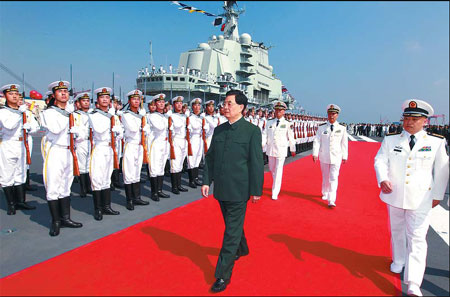IN BRIEF (Page 2)

| President Hu Jintao, chairman of the Central Military Commission, reviews a naval honor guard on the deck of the country's first aircraft carrier in Dalian on Sept 25. Zha Chunming / Xinhua |
Defense
Navy sails into new area
China entered an elite global club of nations after its first aircraft carrier Liaoning was delivered and commissioned to the People's Liberation Army navy after successful sea trials.
President Hu Jintao and Premier Wen Jiabao attended the ceremony held on Sept 25 at a naval base in the northeastern port city of Dalian.
With this, China has become the 10th country, and the last of the five permanent members in the United Nations Security Council, to have an aircraft carrier in active service. The carrier, formerly the Soviet ship Varyag, underwent years of refitting to install engines, electronic equipment and weapons, as well as a number of sea trials.
Development
Programs fuel green concerns
Local government growth programs are causing increasing concerns over their environmental impact, officials from central government agencies warned.
In a bid to boost GDP, provincial and municipal governments have recently rolled out at least 17 trillion yuan ($2.7 trillion, 2.0 trillion euros) in stimulus programs, including giving the green light to environmentally damaging operations, economists warned.
Li Zuojun, an economist at the Institute of Resources and Environmental Policies with the State Council Development Research Center, said he was worried that achievements in energy saving and emission cuts in the more developed eastern provinces may be overshadowed by the building of heavily polluting industries in inland areas.
Those stimulus programs could bring about "a new wave of expansion" in the kind of industries that China does not really want and would pay a dear price for in the future, said an official from the National Development and Reform Commission, who wished not to be named.
Safety
Consumers regaining taste for dairy
Domestic milk quality has improved dramatically after the melamine-tainted milk scandal of 2008, authorities said.
The Ministry of Agriculture has been carrying out special tests since 2009 to examine whether raw fresh milk contains banned additives, including melamine and leather-hydrolyzed protein. More than 56,000 sample batches of raw fresh milk collected randomly from wholesalers nationwide up to the end of last year have been found safe after testing, the ministry said in a statement.
"The quality of raw fresh milk has improved significantly," the statement said.
The tests started after six infants were killed and about 300,000 others were poisoned by melamine-tainted milk in 2008.
Crime
Falun Gong member fined
A Falun Gong practitioner, who damaged an anti-Falun Gong banner hanging outside a metro station in Hong Kong, was found guilty of two counts of criminal damage and one of obstructing public officers in performing their duties.
The woman, whose surname is Lo, was fined HK$4,500 ($580, 450 euros) by a local magistrate. Additional charges were pressed against the woman because of events inside the police station where she was taken, including refusing to have her fingerprints taken.
The prosecution alleged that the accused cut through an anti-Falun Gong banner put up by a Hong Kong civic organization on July 29, this year. She was arrested at the scene of the incident outside the Hung Hom MTR station.
When taken to the police station for further inquiry, Lo was accused of obstructing police officers, by tearing up statement forms and refusing to have her photograph taken. She was charged with two counts of criminal damage and one count of obstructing a public officer.
A representative of the organization whose property was damaged said that the defendant had never admitted her guilt, adding that her remarks at the trial showed no sign of remorse. The organization spokesman said solicitors would be instructed to demand that the Department of Justice of the SAR government appeal to a higher court, seeking a heavier penalty. He also advocated re-evaluation of the meaning of criminal damage to better protect freedom of expression and private property of the people of Hong Kong.
IPR
Anti-piracy campaign wins kudos
Software providers have embraced the wave of business opportunities created by the government's anti-piracy campaign and are expecting to develop a bigger business market as well.
All government departments at central and provincial levels in China are increasingly switching to licensed software. Authorities at the county level and above will do the same by the end of 2013, according to Duan Yuping, a senior official of the National Administration of Copyright.
Licensed products account for most of the software that is already in use since 2003, thanks to a three-year campaign that commenced in 2001.
China Daily
(China Daily 09/28/2012 page2)
Today's Top News
- Experts share ideas on advancing human rights
- Japan PM's remarks on Taiwan send severely wrong signal
- Key steps to boost RMB's intl standing highlighted
- Sustained fight against corruption urged
- Xi calls for promotion of spirit of volunteerism
- Xi calls for promoting volunteer spirit to serve national rejuvenation































